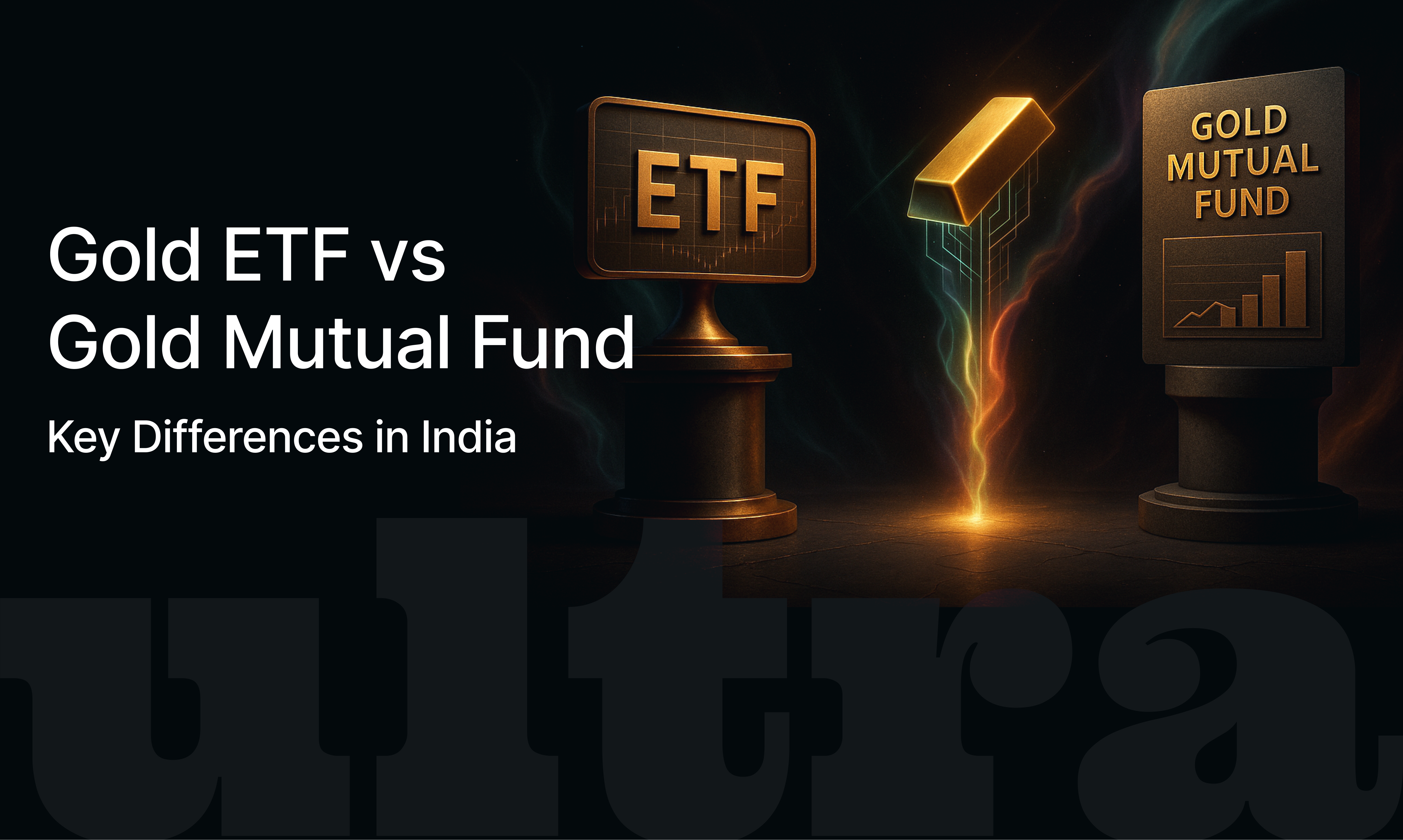Gold ETF vs Gold Mutual Fund: Which is Better for Investors in India?
29 August 2025 · Sachin Gadekar
A complete guide to understanding the difference between Gold ETFs and Gold Mutual Funds in India, covering expense ratio, taxation, returns, and suitability for investors.

Introduction
Gold has always been a preferred investment for Indian households, offering safety, liquidity, and long-term value preservation. With the evolution of financial markets, investors today don’t just buy physical gold but also explore financial instruments like Gold ETFs and Gold Mutual Funds to gain exposure to the yellow metal.
Both Gold ETFs (Exchange Traded Funds) and Gold Mutual Funds track the price of gold and allow investors to participate in gold investment without holding physical gold. However, they differ in structure, cost, taxation, and investment approach.
In this article, we will compare Gold ETF vs Gold Mutual Fund in India, covering expense ratio, taxation, performance, and suitability so you can make an informed investment decision.
What is a Gold ETF?
A Gold ETF is an exchange-traded fund that invests in 99.5% pure gold bullion. Each unit of a Gold ETF usually represents 1 gram of gold, and the fund’s value is linked to the prevailing gold price.
Traded on stock exchanges like NSE and BSE.
Requires a demat account and trading account for transactions.
Prices fluctuate during market hours just like shares.
Backed by physical gold held by the fund.
Example: Nippon India Gold ETF, HDFC Gold ETF, SBI Gold ETF.
What is a Gold Mutual Fund?
A Gold Mutual Fund (or Gold Fund of Funds) is an open-ended mutual fund scheme that invests primarily in Gold ETFs.
Does not require a demat account; can be bought directly from AMC or online platforms.
Managed like any other mutual fund with SIP (Systematic Investment Plan) option.
Ideal for retail investors who want to invest in gold with low entry barriers.
Example: SBI Gold Fund, HDFC Gold Fund, ICICI Prudential Regular Gold Savings Fund.
Gold ETF vs Gold Mutual Fund: Key Differences
| Feature | Gold ETF | Gold Mutual Fund |
|---|---|---|
| Mode of Investment | Traded on stock exchanges; requires Demat account | Invest via AMC or mutual fund platforms; no Demat required |
| Minimum Investment | 1 unit (~1 gram of gold) | As low as ₹100 via SIP |
| Liquidity | Highly liquid; buy/sell anytime during market hours | Redemption possible via AMC; not traded in real time |
| Expense Ratio | Lower (0.5% – 1%) | Higher (0.9% – 1.5%) |
| NAV Pricing | Market-linked; fluctuates during trading hours | Calculated once a day (end of day NAV) |
| Taxation | Same as physical gold – LTCG after 3 years with indexation | Same taxation as Gold ETF (debt taxation rules) |
| Ease of Investment | Requires Demat & trading account | No Demat required; simple like mutual funds |
| SIP Option | Not available | Available |
Gold ETF vs Gold Mutual Fund Expense Ratio
One of the biggest considerations while choosing between the two is the expense ratio.
Gold ETFs typically have a lower expense ratio (around 0.5% – 1%) since they are passively managed.
Gold Mutual Funds come with a higher expense ratio (around 0.9% – 1.5%) because they invest in Gold ETFs and involve additional fund management costs.
If cost efficiency is your priority, Gold ETFs are better. However, for retail investors seeking simplicity and SIP investment, Gold Mutual Funds may be more convenient.
Gold ETF vs Gold Mutual Fund Taxation in India
Taxation rules are the same for both Gold ETFs and Gold Mutual Funds, as they are categorized under non-equity (debt) investments.
Short-Term Capital Gains (STCG): If held for less than 3 years, gains are taxed as per the investor’s income tax slab.
Long-Term Capital Gains (LTCG): If held for more than 3 years, gains are taxed at 20% with indexation benefit.
This makes them identical from a tax perspective.
Which is Better: Gold ETF or Gold Mutual Fund?
Choosing between Gold ETFs and Gold Mutual Funds depends on your profile as an investor:
Pick Gold ETFs if:
You have a Demat account and prefer low-cost investments.
You want to buy/sell units quickly during trading hours.
You prefer high liquidity and transparency.
Pick Gold Mutual Funds if:
You don’t have a Demat account.
You want the convenience of SIP investing.
You are comfortable with slightly higher costs for easier access.
Why Invest in Gold through ultra?
At ultra, we provide a platform to explore multiple investment opportunities – from unlisted shares and alternative assets to traditional products like fixed deposits. For investors keen on diversifying, digital gold and gold-based investments can be a strategic addition.
You can compare different asset classes, track your investments, and start investing seamlessly in a few clicks.
FAQs on Gold ETF vs Gold Mutual Fund
1. Which is better for beginners: Gold ETF or Gold Mutual Fund?
For beginners without a Demat account, Gold Mutual Funds are better since they are easier to buy through SIPs.
2. Do Gold ETFs give higher returns than Gold Mutual Funds?
Returns are almost identical since both track gold prices. However, Gold ETFs may deliver slightly higher returns due to lower expense ratios.
3. What is the minimum investment in Gold ETF vs Gold Mutual Fund?
Gold ETFs require you to buy at least 1 unit (~1 gram of gold), while Gold Mutual Funds allow investment from ₹100 via SIP.
4. How is taxation different for Gold ETFs and Gold Mutual Funds in India?
Both are taxed like debt funds – STCG as per income slab (if held < 3 years) and LTCG at 20% with indexation (if held > 3 years).
5. Can I invest in Gold ETFs and Gold Mutual Funds on ultra?
ultra provides access to multiple asset classes including unlisted shares, bonds, and fixed deposits. Investors can diversify into gold-based products depending on availability.